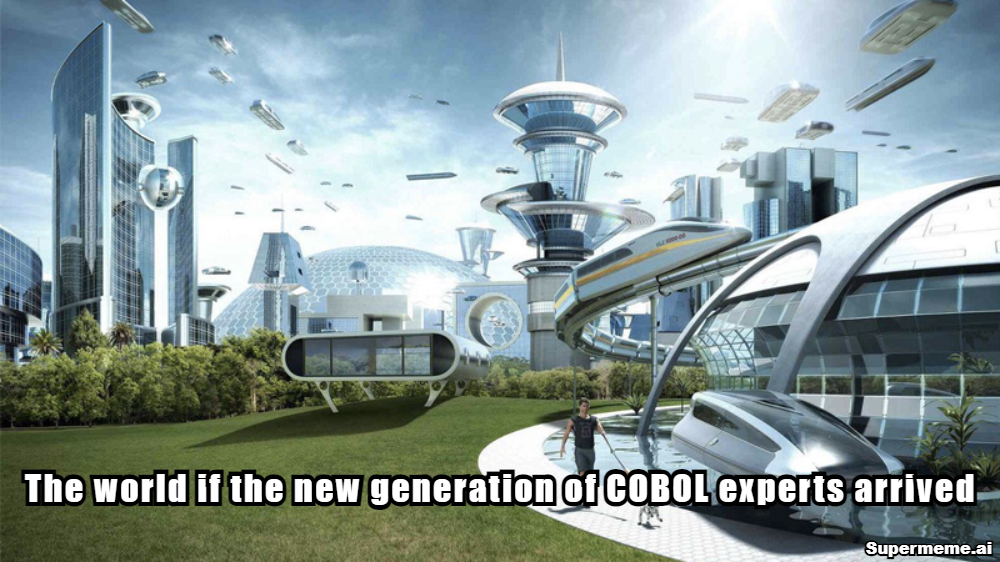The ongoing narrative that COBOL is an artifact of a bygone era simply does not hold up under scrutiny. After more than 60 years of continuous, high-stakes operation, COBOL remains the central nervous system of the global economy’s most critical systems. Detractors dismiss it as outdated, but they conveniently overlook the staggering volumes of financial transactions, logistics processes, healthcare records, tax systems, and essential services that still depend on COBOL every single day. Without it, some of the largest financial institutions, government agencies, and global enterprises would see their core operations grind to a sudden and catastrophic halt. COBOL’s stability and proven reliability are not empty achievements—they are the tangible result of decades of refinement, accumulated business logic, and bulletproof performance under pressure.
Modernization advocates often push for reckless and costly wholesale rewrites, framing COBOL as an archaic hurdle standing in the way of digital transformation. The reality is that this approach frequently sets organizations up for disaster. Ripping out a robust COBOL core to replace it with trendy languages or fragile frameworks invites colossal risk: skyrocketing development budgets, endless debugging cycles, extended staff retraining periods, and the frightening possibility of system-wide outages. Forcing a complete overhaul, rather than integrating COBOL with contemporary tools and user interfaces, is like bulldozing a reinforced fortress to build a flimsy structure of glass and steel on the same exposed terrain. No amount of wishful thinking can disguise how impractical and dangerous that approach can be when billions of dollars in daily transactions hang in the balance.
COBOL’s unmatched resilience lies in its capacity to handle colossal transaction volumes with near-flawless reliability. While newer languages boast elegance or agility, they often bring a perpetual game of chase: constant version updates, security patches, and compatibility concerns that result in mounting technical debt. COBOL, by contrast, evolves at a measured pace. Its syntax and logic remain stable, preserving decades of domain expertise embedded in the code. Critics complain that COBOL isn’t flexible enough, but that is exactly the point. Rapidly changing languages create an environment of continuous upheaval, while COBOL stands firm against the chaos, ensuring uninterrupted service and consistent data integrity.

The sensible path forward is not to discard COBOL, but to harness its strengths by integrating it seamlessly with modern platforms, APIs, and front-end interfaces. Enterprises have successfully leveraged hybrid strategies that couple COBOL’s battle-tested back-end logic with sleek web portals, mobile applications, and advanced analytics engines. The end users never have to know that a venerable language powers the core; they just experience reliable performance, minimal downtime, and accurate results. This approach preserves the stability that boards of directors, regulators, and customers demand, while delivering user experiences that meet contemporary expectations. COBOL is not a relic—it’s an asset that can be enriched rather than undermined by modern technology.
No sector demonstrates this better than banking and insurance, where COBOL quietly processes the vast majority of ATM transactions, manages core ledger operations, and ensures the secure handling of sensitive financial data. These industries are not drawn to COBOL by nostalgia; they choose it because no other solution provides such a perfect equilibrium of consistency, cost-effectiveness, and reliability. Governments around the world still depend on COBOL to administer pensions, distribute social benefits, and handle tax systems precisely because they cannot afford catastrophic downtime or complex conversion projects that may stretch across years and cost obscene sums of money.
A persistent myth claims that COBOL’s talent pool is drying up. This is a self-serving narrative invented by modernization zealots, easily debunked by the robust community of COBOL professionals who continue to maintain, enhance, and secure these critical systems. Organizations that invest in training and knowledge transfer see that COBOL developers are just as capable—often more so—than armies of junior engineers cycling through a dozen frameworks a year. Stability is not merely a function of technology; it is also about the human expertise behind it, and COBOL teams often deliver unparalleled speed and accuracy by drawing on decades of cumulative experience.

There is no sentimental clinging to the past here. The decision to preserve and optimize COBOL systems is a rational calculation rooted in operational continuity and long-term strategic advantage. Many of the world’s largest enterprises have recognized that the cost and risk of full-scale replacements dwarf the benefits of sticking with what works. What could be more pragmatic than leveraging an existing, fully functional engine while carefully layering in modern enhancements for user-facing components? Meanwhile, unproven rewrites gamble with reputation, regulatory compliance, and competitive edge, all to pursue a supposed innovation that often proves elusive.
The narrative that COBOL is obsolete stems from a misunderstanding of what longevity means. In technology, truly foundational languages and systems stand the test of time because they consistently deliver results. COBOL, with its steady evolution and proven capability, was built for mission-critical operations, and that purpose remains timeless. Its age is not a weakness; it is the stamp of authority that comes from decades of success in unforgiving environments. As executives evaluate their next moves, they must consider these fundamentals, rather than falling prey to buzzword-laden pitches that promise everything and guarantee nothing.
In a landscape defined by uncertainty, instability, and fleeting trends, COBOL stands as a profoundly rational choice, the rock upon which enterprises can build their hybrid futures. Integrating COBOL with cutting-edge technologies—cloud platforms, AI-driven analytics, and sophisticated user interfaces—allows companies to enjoy the best of both worlds: the unshakable foundation of trusted business logic and the attractive agility of modern tooling. Rather than bowing to peer pressure and proclaiming COBOL’s irrelevance, smart leaders recognize its critical function and adapt accordingly, crafting a technology strategy that rejects hype in favor of guaranteed operational resilience.
This is not about clinging to the past for sentimentality’s sake. It is about acknowledging that COBOL’s unmatched reliability is a decisive advantage in a world where downtime can trigger reputational disasters and financial ruin. It is about understanding that a measured evolution, rather than a reckless revolution, best serves stakeholders, customers, and regulators alike. Executives who have the courage and foresight to maintain and enhance their COBOL cores—rather than demolishing them at enormous expense—position their organizations for sustained success in an era of volatility. The continued reliance on COBOL may provoke heated debate, but the evidence is overwhelmingly clear: COBOL remains the indomitable cornerstone of global infrastructure, and those who embrace it, integrate it intelligently, and maximize its value will reap lasting rewards.




